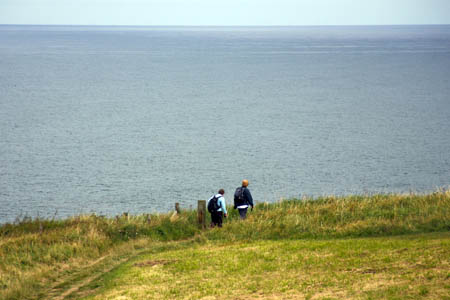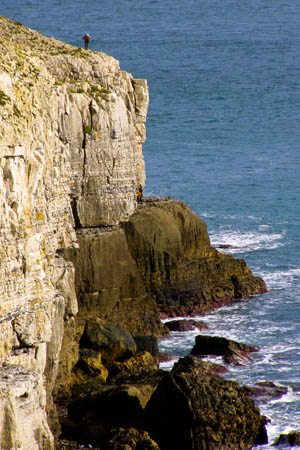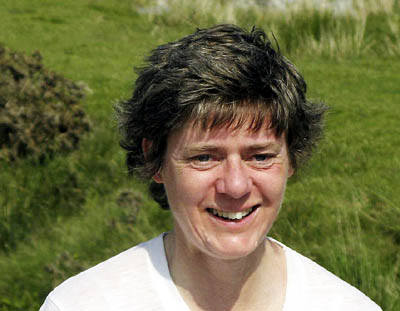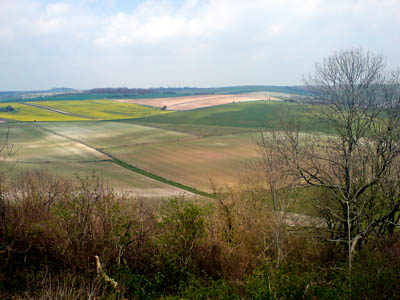
The new act will open up access to the whole of England's coast
Typical! You wait more than 70 years for landmark outdoors laws and then two come along at once.
Campaigners have been reacting to what the Open Spaces Society called a ‘double green-letter’ day with the gaining of Royal Assent for the bill setting up an English coastal path, and the go-ahead for a new national park. Both announcements were made yesterday, Thursday.
The Marine and Coastal Access Act finally became law, paving the way for a coastal corridor around the whole of England, which will connect with a proposed path along the Welsh coastline and the already existing access in Scotland to open the possibility for the first time of unfettered access around the whole length of the British mainland’s shore.
Hilary Benn, Secretary of State for the Environment, had announced in September that the first stretch of the new all-England Coast Path will open in 2012 at Weymouth, home of the Olympic sailing events, in time for the lighting of the Olympic flame.
Natural England, the Government’s advisory body, called the act a landmark moment in the history of countryside access. Its acting chair Poul Christensen said: “This country has one of the finest coastlines in the world but access to it is currently a lottery, with many sections lacking a secure, satisfactory path. The Marine and Coastal Access Act represents a giant step towards sorting out, once and for all, the piecemeal, stop-go nature of coastal access.”
Natural England said the new act will create significant opportunities to develop new coastal routes, secure routes that are currently available only on a permissive basis, and replace the 13 per cent of existing coastal paths that are expected to be lost to coastal erosion in the next 20 years.

Poul Christensen: 'Prize is worthwhile'
The body said it will launch a 12-week public consultation on the scheme that will guide its work. Once this has been approved by the Secretary of State, Hilary Benn, its initial work will concentrate on Weymouth, where the first section, the ‘Olympic Way’, will open in 2012. Other priorities are Kent, Somerset, Norfolk, Cumbria and the East Riding of Yorkshire.
Mr Christensen continued: “We are going to work very closely with local access authorities in implementing the improved access on the ground – consulting widely with individuals, communities, businesses and other key local interests to help us get the coastal route in the right place and address any concerns about impacts on other land uses.
“This painstaking work may take years to complete, but the prize of agreeing, wherever possible, how coastal access can best be extended is a worthwhile one.
“The new act presents a unique opportunity to create a permanent and secure walking route around England’s magnificent coast. This exciting programme will bring economic benefit to coastal regions, end the haphazard tangle of current coastal access and, for the first time ever, provide a solution to the age-old problem of coastal footpaths being lost to erosion.”
Natural England pointed out that walking is already the most popular activity around the coast but Natural England’s national access audit, published in July this year, found that the average section of coast has less than two miles of secure, satisfactory path.

Cath Flitcroft of the BMC: 'Campaigning hard for this for some time'
There is a mix of existing rights, traditions, short-term permissions and sections where the public simply cannot get through at all. Even the best-known stretches such as the South West Coast Path have sections that pass along dangerous roads, and others that require major inland diversions.
Elsewhere, even familiar access routes are often available on a permissive basis only and are not legally secured. Loss of paths to coastal erosion is another familiar problem that often proves difficult to resolve.
Once enacted the new legislation would enable Natural England to develop a continuous path around the whole of England’s open coast – keeping as close to the sea as practicable, and building in unprecedented automatic rollback of the path on eroding sections of coast. There will be close local consultation including ‘walking the course’ with affected occupiers, with a view to agreeing wherever possible, the line the coastal route should take and minimising any impact on privacy and businesses.
There will also be scope to improve coastal access for others such as horse riders and cyclists, and to improve access around estuaries, where doing so would deliver real public benefit and strike a fair balance with other land uses.
Natural England estimates that national implementation of the new rights will take ten years and cost £50 million.

The British Mountaineering Council campaigned to have sea climbing areas included. Photo: Jim Champion ![[CC-2.0]](/lib/img/layout/cc-attr.gif)
The British Mountaineering Council also welcomed the announcement. The council, which represents the interests of climbers, hillwalkers and mountaineers, has campaigned with the Ramblers for the implantation of coastal access.
For the BMC, this meant inclusion of the land between mean low water mark and a point inland, to take in areas such as beaches, the foreshore and cliffs. This is obviously important to ensure access to sea cliffs for climbers.
Cath Flitcroft, the BMC’s access and conservation officer, said yesterday: “Today marks an important moment in the public’s right to access our beautiful coastline, for walking, climbing and other sporting activities, and we have been campaigning hard for this for some time.
“It is now important the new rights are implemented as quickly and smoothly as possible. We will be asking our access volunteers around the coast to work closely with local authorities as the scheme develops.”
The Ramblers also expressed their delight that thousands of miles of inaccessible and out-of-bounds coastline would be opened up for the first time.

Tom Franklin: 'Victory for everyone who walks in this island nation'
The organisation’s chief executive Tom Franklin said: “Years of solid campaigning by the Ramblers have paid off. This historic act marks a victory for everyone who walks in this island nation. The Marine and Coastal Access Act enshrines a very simple principle on the statute books – that everyone, no matter who they are, where they come from or how much money they have has the right to visit all parts of the coast which is so much a part of our heritage.
“The Government deserves genuine congratulations for having introduced the bill, with research from Natural England, and now having carried it through to fruition. What is now needed now is a continued commitment to deliver access on the ground so people have a chance to enjoy the coast.”
The Open Spaces Society, which campaigns on behalf of users of rights of way and open spaces, echoed other groups’ delight at the passing of the act, and also the announcement the same day of the establishment of the South Downs national park, which will be Britain’s fourth largest, covering an area of 1,600sq km (618 sq miles).

Kate Ashbrook: 'Health and happiness to residents and visitors of this small island'
OSS general secretary Kate Ashbrook said: “Two campaigns, which have engaged the Open Spaces Society throughout most of its 144-year existence, reach fruition today: the South Downs is confirmed as a national park, and the Marine and Coastal Access Bill becomes an act.
“Today too the Marine and Coastal Access Bill receives royal assent. The new act will lead to the creation of a walking trail right round the coast of England, with a coastal margin where people may roam responsibly away from the path.
“Our society called for this law at least 70 years ago and our efforts are at last rewarded.
“This historic act will bring health and happiness to residents and visitors of this small island, and it will boost the economy of coastal areas. We look forward to the trail being in place.”
Henry Aubrey-Fletcher, president of the landowners’ organisation Country Land & Business Association, said: “We will be supporting CLA members who feel they’re being treated unfairly and advising them on how to appeal.
“We have never supported the coastal access provisions of the bill. And now it is law, we are determined to ensure it causes as little disruption to coastal businesses as possible.”
On the South Downs announcement, Ms Ashbrook commented: “The society has long campaigned, alongside many other bodies and more recently as a member of the South Downs Campaign, for the South Downs to be protected as a national park. Back in 1947 the area was recommended for park status by the far-sighted National Parks Committee – the ‘Hobhouse Committee’. The South Downs confirmation makes the Hobhouse list complete at last.
“This unique, outstandingly beautiful and grand landscape, close to conurbations yet tranquil and unspoilt, needs to be cherished and enjoyed. We are jubilant that today its protection is secured.”
The new national park, stretching from Beachy Head to the edge of Winchester, will be the most populous, with an estimated 120,000 people living within it. The Western Weald, which was an area of contention, will be included.
Poul Christensen of Natural England said: “The South Downs is a priceless environmental asset in one of the most densely populated areas in the world. It fully deserves its new national-park status which stands out as a statement of ambition for the way landscapes need to be protected and valued in 21st century England.
“National Park status for the South Downs is the final realisation of a very proud vision. It is sixty years since the 1949 National Parks Act became law and what better way to celebrate that legacy than by recognising the South Downs for what it very obviously is – a beautiful, wildlife-rich and uniquely accessible landscape.”
A new national park authority is expected to be set up by April 2010.

The Piglit
14 November 2009Whilst large campaigning organisations are understandbly jubilant, I think the rest of us more humble and often solitary walkers and runners should greet this with a little more caution.
Firstly the timescale involved, if I have read the article correctly, is open ended, and the phrase "may take years to complete" is used without qualification or estimate.
Secondly, and again if I have read this correctly, the unelected and undemocratic NGO Natural England will assume development and control of this project and, one may infer the whole of the path.
Given that both Labour and the Tories have radical plans for the privitasion of public bodies and services, we could see land passing back effectively into private ownership.
Still as long as we can bimble along without ever paying, that's great. But then that begs the questions of just how much this project will cost and how it will be financed.
Tread carefully!
Tony Greaves
15 November 2009The proposed timescale for completion of the English coastal path and associated coastal access land ("spreading room") is ten years. Natural England intend to do the areas with most need (ie least existing access) first. (See http://www.naturalengland.org.uk/about_us/news/2009/121109c.aspx)
First a Coastal Access Scheme (a national scheme for England) has to be drawn up and approved by the Secretary of State - lots of work already done - the Consultation Version of the scheme is now out for consultation and can be found on the NE website, and is worth looking at to see how things may work out.
When the Scheme is approved Coastal Access Plans will be produced for each stretch of coast. Natural England are indeed in charge of the process and its development though they will work with access authorities (County & Unitary Councils) in each area, and they (NE) are financing it.
Whatever you think of national quangos (and I am no fan) this will guarantee some uniform standards, and progress - as long as NE still exist, and have the remit and the finance.
In my view the main danger now is that a Tory Government will cut backon the funding and perhaps hand over responsibility to the local authorities, some of which may backtrack on the project and be much less robust with recalcitrant landowners.
Tony Greaves
The Piglit
18 November 2009Mr Greaves
Without wishing for this to descend into a forum, further research reveals that the act sets up an overarching Maritime Management Organistion which "enables" Natural England to set up a walking route.
So, this route is part of something else and
the process may be even more complex and to use a cliche, bureaucratic.
Also the ten year timescale is fairly well buried in the document you post a link to, which I have read, and is not a hard and fast (or service level!) agreement.
The final point I would like to make is a crucial one, namely that the question of access is one "resolved" by new ownership and construction which is uncertain in it's constitution, future and financing, when...
....an act giving right of access to walkers could have addressed the fundamental issue at a stroke.
Oh and if you think the Tories are the biggest danger you clearly haven't understood the agenda of the current administration.